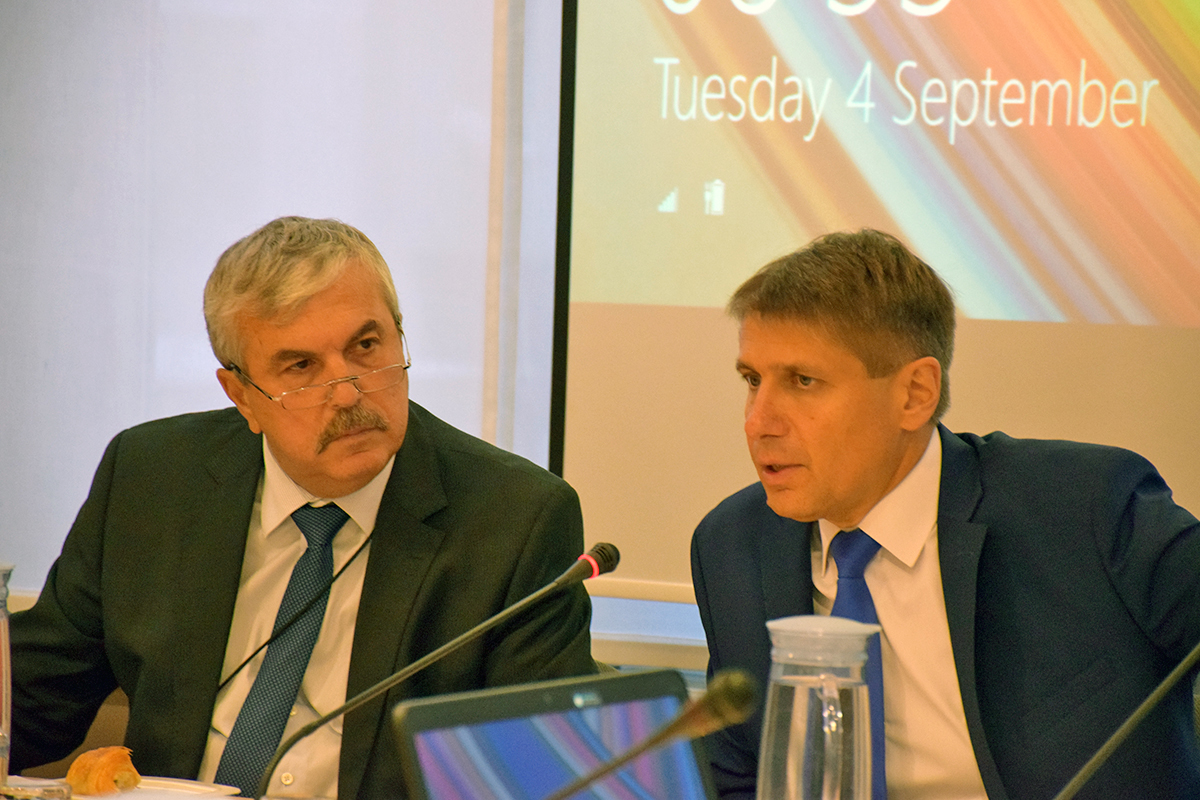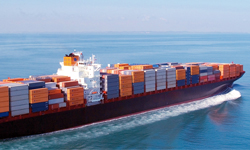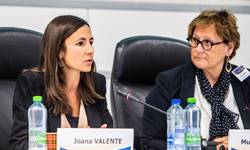BusinessEurope Headlines No. 2018-28
Well-designed “Horizon Europe” essential for companies’ investment decisions

“The single most important objective is to overcome Europe’s innovation deficit. In other words, how can we better harvest the economic benefits of innovation. Business is your strongest ally to win this race”, said Markus J. Beyrer, Director General of BusinessEurope, at a breakfast debate on 4 September with the Member of the European Parliament (MEP) Dan Nica, rapporteur on the Horizon Europe Regulation. “If well-designed, Horizon Europe can be decisive for companies’ next investment decisions as to where to invest, when to investment, how much to invest and on what to invest”, Beyrer commented. MEP Nica exchanged views on the programme with members of the BusinessEurope Research and Technological Innovation working group. See our detailed views here.
![]() Contact: Alexandre Affre
Contact: Alexandre Affre
Our comment
Holidays are over: back to the stormy world of trade
By Luisa Santos, Director for International Relations
 We are slowly returning from the holiday season to discover that not much has changed in the stormy world of trade. The only positive but important change is that the EU and the U.S. are talking and trying to build a positive agenda. If these talks succeed we can actually improve life for companies on both sides of the Atlantic. By eliminating customs duties and addressing some of the non-tariff barriers in key economic sectors, the EU and the U.S. would be showing leadership on trade. Proving the transatlantic economy, the most important trade and investment relation in the world, works!
We are slowly returning from the holiday season to discover that not much has changed in the stormy world of trade. The only positive but important change is that the EU and the U.S. are talking and trying to build a positive agenda. If these talks succeed we can actually improve life for companies on both sides of the Atlantic. By eliminating customs duties and addressing some of the non-tariff barriers in key economic sectors, the EU and the U.S. would be showing leadership on trade. Proving the transatlantic economy, the most important trade and investment relation in the world, works!
Unfortunately, in other areas the trade panorama remains very gloomy. The U.S. continues to block the appointment of judges to the World Trade Organisation (WTO) Appellate Body that is now reduced to 3 judges. Considering the increasing number of complaints, many resulting from U.S. actions, there is a serious and imminent risk that the whole trading system collapses. If there is no effective way of settling trade disputes, how can we prevent illegal actions and avoid countries deciding unilaterally on how to respond?
Companies are the first victims of this situation. Business operates under stable and known rules that must be properly enforced. If each country decides on its own interpretation of the rules this will have negative consequences on trade and investment worldwide with smaller countries being the main losers. The EU is doing its share by taking a pro-active approach putting concrete proposals to reform the world trading system on the table. Will this be enough to convince other key players, in particular China, the U.S. or even India?
The business community can play a decisive role in ensuring that everyone understands the full repercussions of a “no-rules scenario” on trade and investment decisions. It is true that many are not listening to facts or rational arguments. But we need to keep hammering! We need to keep showing that trade uncertainty is not good for business and ultimately it is not good to sustain economic growth and job creation.
It is wrong to think that solutions that did not work in the 20th century will be more successful today. Trade and investment relations have changed a lot in the last decades with the digital revolution and the emergence of new trading super-powers like China. We need enforceable rules and an independent body to settle trade disputes. Otherwise the system risks being biased towards the biggest and strongest and not necessarily fair.
Contact: Luisa Santos
EU-Canada: debate on sustainable development through trade
 BusinessEurope took part in the first EU-Canada Civil Society Forum established under the Comprehensive Economic and Trade Agreement (CETA) that took place on 12 September in Brussels almost one year since the provisional entry into force of the agreement. Officials from the European Commission and from the Government of Canada exchanged views with civil society representatives from employers, unions, labour and business organisations, environmental and consumer groups, together with other relevant organisations. “BusinessEurope, a strong supporter of the CETA, is committed to sustainable development through trade”, said Eleonora Catella, BusinessEurope Senior Adviser. She added that businesses and employers play an important social role, generating employment and growth. European business also welcomed the Paris Agreement and stressed that innovative companies are a key partner towards more environmentally sustainable goods and services. “We look forward to further cooperating with civil society organisations in both the EU and Canada on trade matters and sustainable development”, Catella said.
BusinessEurope took part in the first EU-Canada Civil Society Forum established under the Comprehensive Economic and Trade Agreement (CETA) that took place on 12 September in Brussels almost one year since the provisional entry into force of the agreement. Officials from the European Commission and from the Government of Canada exchanged views with civil society representatives from employers, unions, labour and business organisations, environmental and consumer groups, together with other relevant organisations. “BusinessEurope, a strong supporter of the CETA, is committed to sustainable development through trade”, said Eleonora Catella, BusinessEurope Senior Adviser. She added that businesses and employers play an important social role, generating employment and growth. European business also welcomed the Paris Agreement and stressed that innovative companies are a key partner towards more environmentally sustainable goods and services. “We look forward to further cooperating with civil society organisations in both the EU and Canada on trade matters and sustainable development”, Catella said.
Contact: Eleonora Catella
Cohesion policy 2021-2027: opportunity to boost its efficiency and delivery
 “The next Multiannual Financial Framework (MFF) must concentrate efforts on improving EU’s competitiveness. EU cohesion policy is a very important tool to achieve this, and we must take this new cycle as an opportunity to ensure we simplify its functioning in order to boost its efficiency and delivery.” This was a key message passed by Joana Valente, Senior Adviser and Strategy Coordinator at BusinessEurope, during a European Economic and Social Committee (EESC) hearing on 7 September. “Cohesion policy must be a key part of an EU’s investment policy and be given adequate resources to support a more cohesive Europe, which is a basic condition for a proper functioning of the EU, and the Euro area in particular”, she stressed.
“The next Multiannual Financial Framework (MFF) must concentrate efforts on improving EU’s competitiveness. EU cohesion policy is a very important tool to achieve this, and we must take this new cycle as an opportunity to ensure we simplify its functioning in order to boost its efficiency and delivery.” This was a key message passed by Joana Valente, Senior Adviser and Strategy Coordinator at BusinessEurope, during a European Economic and Social Committee (EESC) hearing on 7 September. “Cohesion policy must be a key part of an EU’s investment policy and be given adequate resources to support a more cohesive Europe, which is a basic condition for a proper functioning of the EU, and the Euro area in particular”, she stressed.
Contact: Joana Valente
STEM skills a key component for growth and employment in Europe
 Science, Technology, Engineering and Mathematics (STEM) skills are increasingly required by employers across a broad range of sectors and occupations. Employers highlight a specific shortage as concerns engineers, computer scientists and data analysts. Due to the increasing digitisation of society and the world of work the demand for STEM skills will only intensify. These are part of the main messages from BusinessEurope’s position paper on the role and importance of STEM skills. Employers, independently, and together with education and training providers, have an important role to play in fostering the acquisition of STEM skills and promoting STEM-related careers to underpin Europe’s future industrial development.
Science, Technology, Engineering and Mathematics (STEM) skills are increasingly required by employers across a broad range of sectors and occupations. Employers highlight a specific shortage as concerns engineers, computer scientists and data analysts. Due to the increasing digitisation of society and the world of work the demand for STEM skills will only intensify. These are part of the main messages from BusinessEurope’s position paper on the role and importance of STEM skills. Employers, independently, and together with education and training providers, have an important role to play in fostering the acquisition of STEM skills and promoting STEM-related careers to underpin Europe’s future industrial development.
Contact: Robert Plummer
EU New Deal for Consumers: not a balanced deal
 In response to the European Commission’s New Deal for Consumers, BusinessEurope has adopted position papers on the proposal on representative actions (collective redress) and the proposal on better enforcement and modernisation of EU consumer protection rules (the Omnibus proposal). Overall, the New Deal proposals seem like a solution in search of a problem, since EU citizens already enjoy the most efficient and strongest consumer protection in the world. The Commission proposals reintroduce options to Member States for consumer rules and attempt to partial shift enforcement of rules to private actors which comes along with a litigation culture. Given that the EU consumer law has generally been deemed fit for purpose, the focus should continue to be on public enforcement, out-of-court dispute-resolution and more awareness. You can read the position paper on collective redress for consumers here and the position paper on the Omnibus proposal here.
In response to the European Commission’s New Deal for Consumers, BusinessEurope has adopted position papers on the proposal on representative actions (collective redress) and the proposal on better enforcement and modernisation of EU consumer protection rules (the Omnibus proposal). Overall, the New Deal proposals seem like a solution in search of a problem, since EU citizens already enjoy the most efficient and strongest consumer protection in the world. The Commission proposals reintroduce options to Member States for consumer rules and attempt to partial shift enforcement of rules to private actors which comes along with a litigation culture. Given that the EU consumer law has generally been deemed fit for purpose, the focus should continue to be on public enforcement, out-of-court dispute-resolution and more awareness. You can read the position paper on collective redress for consumers here and the position paper on the Omnibus proposal here.
![]()
![]() Contact: Marie Krogsgaard Pedersen
Contact: Marie Krogsgaard Pedersen
Calendar
- 20 September: Informal European Council in Salzburg
- 21 September: One year anniversary of the implementation of the free trade agreement between the EU and Canada (CETA)
- 27 September: Competitiveness Council
- 26-29 September: European Forum for New Ideas (EFNI) in Sopot
Reminder: please take a look at our revised privacy policy
